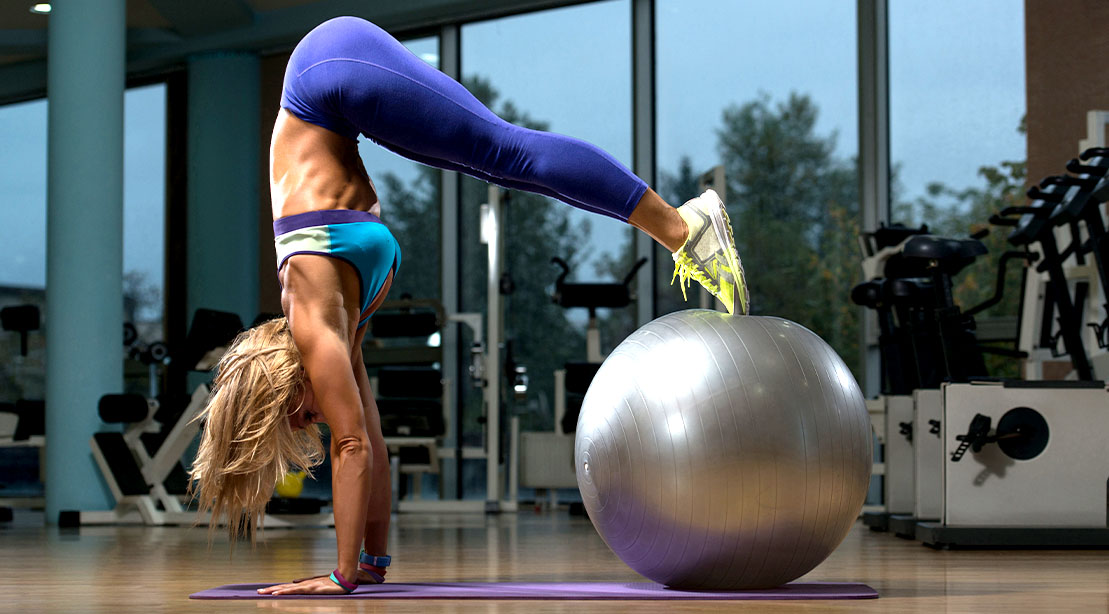Many lifters get the wrong idea regarding strengthening the core. They perform endless crunches or planks that leave them staring at the floor. While those exercises have their place, they often miss the core issue. A strong core isn’t just about the six-pack; it’s about stability and the ability to generate and resist movement, which matters most.
Enter the stability ball pike. This dynamic exercise challenges your core strength and tests your balance, coordination, and flexibility in ways few core-focused movements can. Whether you’re a seasoned lifter or looking to step up your core game, the stability ball pike has something to offer everybody.
Ready to sculpt a core that’s as functional as it is strong? Let’s explain why the stability ball pike deserves a starring role in your workouts.
What is the Stability Ball Pike?
The stability ball pike is a challenging exercise that blends core strength, stability, and flexibility. Picture this: you’re in a plank position with your shins balanced on a stability ball while in the plank position, and then you roll the ball toward your hands by lifting your hips into a pike position.
Sounds simple? Think again.
At its core (pun intended), the stability ball pike trains your core to resist unwanted movement while creating motion. From your shoulders to your toes, everything is involved. If you’re looking for an exercise that combines strength and control with a dash of humility, the stability ball pike checks all those boxes and more.
How To Do The Stability Ball Pike
Good form is critical to achieving the stability ball pike’s benefits. Follow these step-by-step instructions to ensure you get the most out of this fantastic exercise.
- Start in a pushup plank with your hands under your shoulders, arms straight, and legs extended behind you.
- Place your shins on top of a stability ball, ensuring your body forms a straight line from head to heels.
- Brace your core like you’re about to be punched in the tummy.
- Then, lift your hips toward the ceiling by rolling the stability ball toward your hands. Create a “V” shape with your body, keeping your legs straight and your feet on the ball.
- Slowly lower back to the plank position by rolling the ball away from your hands, reset, and repeat.
Common Mistakes and Fixes
The stability ball pike is a fantastic exercise, but to get the most out of it, you must pay attention and avoid these common pitfalls.
You’re Dropping Your Hips
The Problem: Sagging hips shift the focus away from your core and place unnecessary strain on your lower back.
The Fix: Focus on bracing your core by thinking someone will punch you there and squeezing your glutes. If your hips keep sagging, reduce the range of motion or try a regression until you build more core strength.
You’re Arching Your Lower Back
The Problem: An arched lower back means your core isn’t fully operational, which reduces the benefits and makes your lower back very unhappy.
The Fix: Before starting, tuck your pelvis slightly to maintain a neutral spine. Keep this as you perform and return from the pike. If you feel your back arching, pause, reset, and focus on a range of motion you can control.
You’re Rushing Through the Exercise
The Problem: Speeding through the pike will get this challenging exercise over and done faster, but it reduces control and allows momentum to take over, minimizing muscular tension.
The Fix: What the hurry? Slow down. Focus on controlled movements when rolling the ball in and returning to the plank. Remember, this is a core strength exercise and not a race.
You’re Off Balance
The Problem: Wobbling or falling off the ball indicates a lack of core bracing or improper set-up.
The Fix: First, pay attention to your setup and ensure you have the correct-sized ball. Start with a reduced ROM or practice holding a plank on the ball before progressing to the pike.
Benefits of The Stability Ball Pike
The stability ball pike delivers serious benefits that go beyond aesthetics, and here’s why it deserves a spot in your workouts.
Enhanced Core Strength
This exercise is all about enhancing core stability. It strengthens the deep core stabilizers, like the transverse abdominis, while also targeting the hip flexors, rectus abdominis, and obliques. The result? A core that’s all show and go.
Improved Balance and Coordination
Balancing on a stability ball while performing the pike strengthens your hip and shoulder stabilizer muscles. This translates to better overall balance and coordination in and out of the gym.
Better Flexibility and Mobility
As you roll into the pike, your hamstrings and hip flexors are put through a controlled stretch. Over time, this improves flexibility and mobility, which is a win for anyone looking to move and feel better.
Strengthened Shoulder Stability
Supporting your weight in the plank position while balancing on the stability ball challenges your shoulders to stabilize throughout the pike, adding another layer of upper body strength.
Programming Suggestions
I like to program the stability ball pike in two ways, and both involve doing it before you hit the iron.
Core Triset Workout Example
Pair it with other anti-extension and rotational core exercises like planks, and Pallof presses for a total core workout before hitting the weights
Stability Ball Pike: 2 sets of 8-10 reps
Breathing Side Plank: 2 sets of 3 to 5 breaths per side
Deadbug: 2 sets of 6 reps per side
Warmup
Incorporate the pike into your warm-up to wake up your core and improve focus for heavier lifts.
Reps and Sets
Beginner: Start with 2-3 sets of 5-8 reps, focusing on good form.
Advanced: Progress to 3-4 sets of 10-12 reps, or increase the intensity by slowing the movement or pausing in the pike position for a few seconds.
